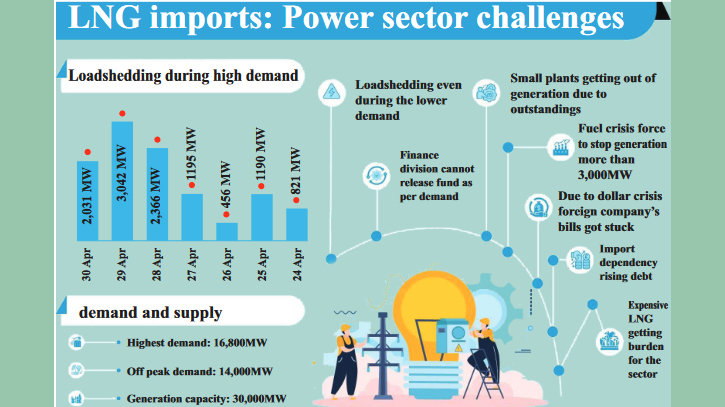
Photo: Messenger
The pride of the government is the success of the power sector, which now has multifaced problems because of the import-based master plan and the delay in the exploration of domestic resources.
The peak demand during the heatwave has tasted the strength of the sector as the countrymen, especially villagers, have experienced six to eight hours of load-shedding despite having 15,000 MW capacity.
Experts think the government started its journey in developing the power and energy sector with a wrong master plan. That has now created suffering due to hikes in power tariff and rising outstanding bills.
Eminent energy expert Prof Shamsul Alam told The Daily Messenger, “The sector is getting weaker due to its whimsical and import-based master plan. Due to fund crisis, the government cannot pay the dues of imported coal, LNG, and electricity.”
State Minister for Power Nasrul Hamid told The Daily Messenger, “Power and energy is a big sector. Crisis might arise here. In business, outstanding is a common phenomenon and it will be solved. In fact, we are paying bills every month.”
“Besides, we have started exploring our own resources. About 100 gas wells have been taken to extract gas. And we are going to deep and shallow sea too,” he said.
Energy expert Prof M Tamim said, “Of course, import is one kind of solution but not the ultimate one. The country is growing fast. Foreign investment is coming gradually in the county based on gas and electricity availability. So, we need secure fuel. Import dependency has already created complexities.”
Load-shedding
During the tenure of 15 years of the present government, huge infrastructure in the power sector has been developed with 30,000 MW capacity. But, highest 17000 MW of power could not be generated during the heat wave. The people of the country have experienced more than seven hours of load-shedding.
Fuel crisis
The state-owned Petrobangla cannot supply gas to the grid to feed the power plants as per demand as domestic gas is depleting fast. As a result, Petrobangla is importing LNG under short-term contracts from the spot market with high prices, causing hikes in power prices.
Outstanding bills
In the war-prone economy, the government faced the dollar crisis to pay the bills of imported electricity and LNG, coal and fuel oil. Besides, dollar price also gets high. That resulted in outstanding bills reaching to Tk 43,000 crore. The Finance Division and the Bangladesh Bank cannot disburse the bills due to fund crisis.
Import dependency
Import dependency is the biggest barrier for the power sector. All the international political crisis has hit the energy market. So, the government has to import energy at high prices if the market gets unstable due to international crisis.
Unstable fuel market
The two coal-based mega projects – Payra with 1,320 MW capacity and Rampal with 1,320 MW capacity – faced month-long shutdowns several times due to coal crisis. As the coal price was high, the government could not arrange the coal for the plants. At that time, the country, even Dhaka, faced frequent load-shedding.
Expensive LNG
In the financial year 2022-23, LNG imports accounted for 22 per cent of the country’s total gas requirement. So, to feed the plants, the government is importing huge LNG from international market and paying bills in dollars.
Meanwhile, the government has made a master plan for 2050, estimating $300 billion and focusing on LNG import. It set a goal to achieve 8.6 per cent GDP growth, though experts consider the master plan an imprudent one.
According to the plan, in 2041, the demand for electricity has been estimated at 50,364 MW. Against this demand, the production capacity has been asked to be increased by 74,300 MW, which is 47 per cent more than the demand.
Of this, the power generation capacity will be 11,500 MW from coal, 6,700 MW from oil, 29,300 MW from gas and LNG, 4,800 MW from nuclear power plants, 1,000 MW from hydropower, 2,000 MW from wind, 6,000 MW for solar, 11,200 MW from hydrogen, 5,000 MW from ammonia, and 15,700 MW will be imported by the year 2050.
Messenger/Disha








